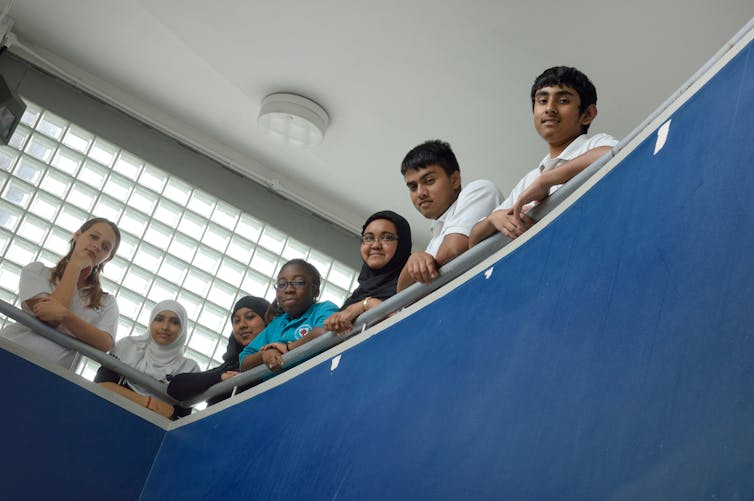[ad_1]
Whiteness is an creation of the modern, colonial age. It refers to the racialisation of white people and the disproportionate privilege – social, linguistic, economic, political – that arrives with this. Crucially, as an invention, whiteness is not innate – it is taught.
As an educational challenge, whiteness is intended to maintain racial hierarchies. Whether or not or not that intention continues to be or is recognised in modern day universities, the racism underpinning that instructional challenge carries on to shape education and learning in England.
Black children are extra probable to deal with disproportionate disciplinary strategies and be excluded. They face discriminatory hair guidelines, and, when their speech is considered to differ from “standard” or “academic” English, they facial area anti-black linguistic racism.
And in the latest years, whiteness and anti-black linguistic racism have become even further normalised beneath the so-known as “what works” agenda of training policy.
The British isles federal government launched the What Will work network in 2013, in get to design and style policies, and how they are sent, on the basis of what they termed “the best” study evidence readily available.
In instruction, this declare that policymaking is scientifically aim and evidence-led is applied to bolster the thought that the resulting guidelines will effectively do what they say, namely tackle inequality. However, my operate exhibits how what-will work-based schooling plan is not goal or neutral. It normalises white, middle-course language and can result in the use of non-standard, non-academic language becoming disciplined in faculties.

Parker Pictures/Alamy
The ‘what works’ agenda
Concerning 2021 and 2022, I done analysis in two various secondary educational institutions in London. I observed school rooms, did interviews and analysed insurance policies and lesson supplies.
Each schools had the vast majority white staff members, serving largely black children from minimal-earnings households. The two educational facilities experienced subscribed to a “what works” tactic to language educating.
The to start with school had launched “evidence-led” curriculum resources, entitled English Mastery. Academics I collaborated with documented how these products encouraged them to accurate how their pupils spoke, staying away from language considered to deviate from normal norms.
As a result, black young children merely stored quiet or generated negligible solutions, which they ended up even further criticised for. Becoming designed to internalise the ideology that their language was deficient resulted in their identity being eroded, an effect which study bears out.
This ideology was further articulated by the staff I interviewed. A person instructor mentioned “what works” curriculums would “address persistent errors” and curtail the use of “colloquial” speech, therefore letting marginalised young children to “function adequately in the world”. An additional trainer explained how administration had insisted on a “standard English only” coverage since they deemed lecture rooms to be entire of what they termed “poor high quality talk”.
Research has extensive demonstrated that conventional and academic English are not neutral groups but social and colonial constructions dependent on the language of the white middle lessons. Yet in these educational institutions, getting standard and educational English is seen as the path to social justice. Very similar considering has been demonstrated to underpin conclusion-building at Ofsted, the United kingdom faculties inspectorate and national policy far too.
Regardless of the claimed intentions all over racial fairness and justice with which they are marketed, “what works” components possibility reproducing anti-black prejudice. They outline any scholar as “functioning” or “working” as just one who models their language on whiteness. And they even now result in functioning-class, black youngsters struggling with language discrimination, for the reason that, as investigate reveals, beliefs about so-called “proper language” generally relate to beliefs about race and course.

Monkey Enterprise Photographs/Shutterstock
The ‘word gap’
In an additional university I researched, management experienced created policies to tackle the so-referred to as “phrase hole”. Due to the fact the 2010s, there has been a resurgence amongst training specialists in England – policy makers at Ofsted, authors of instructor textbooks and the instruction publishing market at significant – of this strategy, which is rooted in 1960s theories of verbal deprivation and was recycled in 1990s academic psychology.
As instruction secretary in 2012, Michael Gove told the British isles parliament that the absence of attainment in children from deprived backgrounds was because of to “growing up in households the place they are not browse to and in which they do not have a wealthy literary heritage on which to draw”. Amanda Spielman, chief inspector at Ofsted reiterated this place in 2018: “These small children get there at faculty with out the text they have to have to converse properly.”
This reductive argument poses that the solution to systemic inequalities but in supplying marginalised youngsters extra, “better” words and phrases than what their households and communities provide them with. In other words and phrases, it blames not the socioeconomic program for failing these communities but the communities on their own for not obtaining the right language and literacy techniques.
In a person university, where by administration had subscribed to this variety of thinking, believing that it was in the ideal passions of marginalised young children, I discovered that word-hole interventions intended black functioning-class little ones have been substantially more very likely to have the way they talk categorised as deficient. Somewhat than creating their vocabulary, this strategy way too resulted in young children trying to keep peaceful in classes, internalising the strategy that their language was not tutorial ample.
Tough anti-black linguistic racism
Instructional linguists have persistently pointed out that language hierarchies are not primarily based on empirical reality but stem from institutional racism. As sociologists Remi Joseph-Salisbury and Derron Wallace set it, “speech codes and vernacular connected with black youth are witnessed as oppositional to, and disruptive of, academic orientations”.
To counter this, the academics I collaborated with in my research intended new classroom resources that would, as an alternative, affirm students’ voices. We worked with the black British writer Benjamin Zephaniah, working with his 2020 novel Windrush Youngster and interviews he has presented in which he talks about his encounters of obtaining his language and racial identification policed.
His activities matched quite a few of the college students we worked with. For illustration, when asked to entire a linguistic profile of them selves, a single scholar Pleasure, who, with Nigerian heritage speaks English and Yoruba, drew a portrait of herself with her mouth clamped shut. She was capable to unpick how her Yoruba, previously, had been silenced in faculty.
Young children had been inspired to interrogate the intersections of electricity, class and race which sees their personal language stigmatised. Their conversations were also, crucially, joyful and whole of adore for black language and tradition.
A further trainer collaborated with mom and dad and learners on a new total-university language coverage, which insisted that black kids are just as linguistically dexterous as their white peers and emphasised that there is no racial justice without linguistic justice. The 1st draft of the plan stated:
We do not think in the existence of a phrase hole and wholly reject such deficit and racist descriptions of language. If a hole does exist, it exists in the way that people today understand language, rather than how they use it.
Beliefs about language are in no way just about language. They reflect institutional electricity dynamics. As 1 black teacher I collaborated with put it:
We will need to prevent considering that the way young children talk is the issue, and start off pondering about the way that older people pay attention as the dilemma
[ad_2]
Resource website link
Meet Our Successful Graduates: Learn how our courses have propelled graduates into rewarding
careers. Explore their success stories here!
Discover More About Your Future: Interested in advancing your teaching career? Explore our
IPGCE, MA, and QTS courses today!

Explore Our Courses: Ready to take the next
step in your education journey? View our
comprehensive course offerings now!

